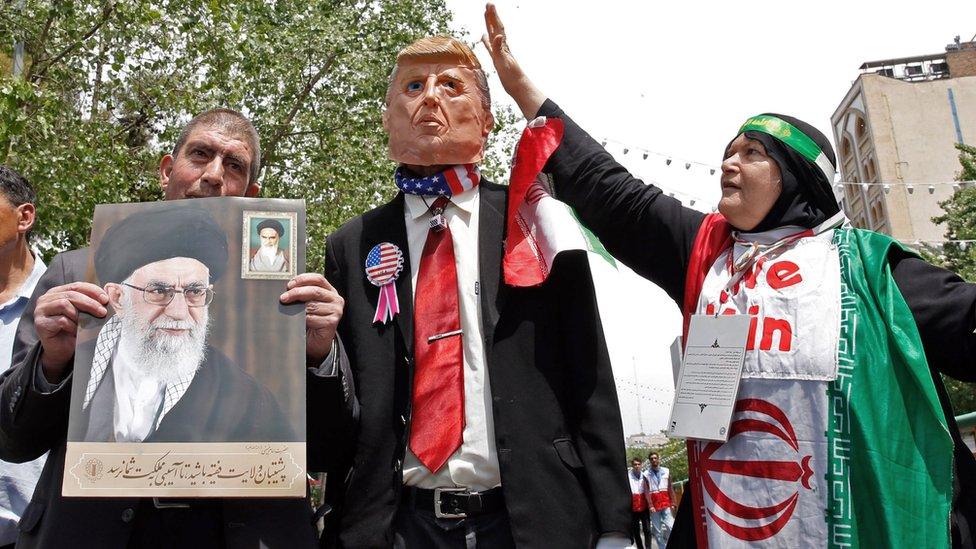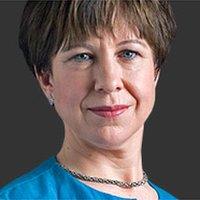A diplomatic whirl to avoid war in the Gulf
- Published
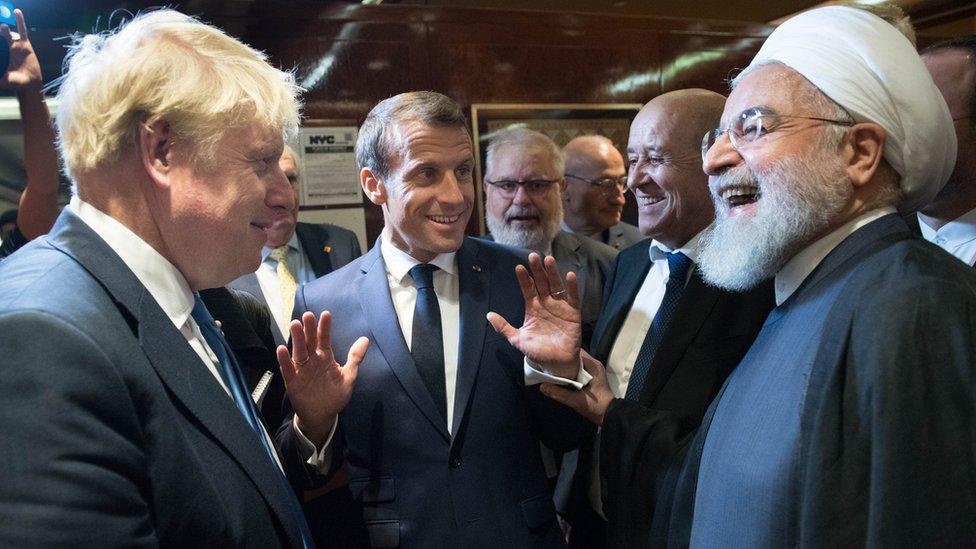
Britain and France among others are pressing for a historic meeting between the US and Iran's President Hassan Rouhani (right)
The annual rush of diplomatic speed dating at the UN General Assembly ended this week without commitments or conclusions from leaders anxious to avoid another Middle East war, as tensions simmer in the strategic waterways of the Gulf.
But this year's stage was packed with matchmakers and mediators - allies eager to ease animosities among enemies.
And they seem to have broken a bit of the ice.
"Maximum diplomacy," is how a senior UK diplomat described this year's flurry of efforts to build confidence, and even move closer - but still not close enough - for a historic meeting between the US and Iranian presidents.
"We need to find a way through the US's maximum pressure' and Iran's 'maximum resistance'," the diplomat explained, while adding there had to be "robust responses to Iranian misbehaviour".
The procession of would-be peacemakers sweeping in and out of hotel suites in New York included leaders of France, Germany, Japan, Britain, Pakistan, Iraq, Oman and more. Some audacious efforts were revealed in whispered accounts which didn't stay secret for long, and some startling encounters captured by smartphones in the crowds.
'Maximum diplomacy'
It was French President Emmanuel Macron's mega-mediation, months in the making, which seems to have yielded the greatest dividend.
Once he returned to Tehran this week, Iran's President Hassan Rouhani praised France's efforts and described a four-point plan for the start of Iranian-American talks as "acceptable". Faint praise from one side - but the clearest signal yet that a process was inching forward, however slowly, after many months of a diplomatic deadlock.
It's a process so sensitive, with so many competing interests and hardliners on so many sides, that it could also so easily collapse.
The Iranian leader blamed President Trump for the failure of the French plan.
But the Iranians also pulled back from the brink.
"They offered to the Americans an exchange of papers which would set out their guarantees but the Americans refused to do this," explained a diplomatic source.
France's plan is said to include Iran's commitment to never seek nuclear weapons, to comply with obligations in a long-term framework for its nuclear ambitions, and to pursue regional peace, including in Yemen, through negotiations. The US would commit to ending sanctions and allow Iran to resume its exports, including its vital oil supplies.
How sanctions affect Iran... in five objects
"The French pushed as hard as possible but they weren't able to solve the sequencing of who takes the first step," says Ellie Geranmayeh, deputy head of the Middle East and North Africa programme for the European Council on Foreign Relations. "The Iranians wanted an announcement first from President Trump on sanctions and he wasn't willing to give that."
Diplomacy Trump-style is an upending of traditional diplomacy by starting with the high-stakes summit, the cameras-clicking-photo-op worthy of a cascade of tweets. Sources say he's tried for years, through various intermediaries, to meet President Rouhani despite his repeated denunciations of Iran's "menacing behaviour" and successive waves of crippling sanctions in a campaign called "maximum pressure".
"Memento photos are the final stage of negotiations, not the first one," President Rouhani pointed out in his speech to the UN General Assembly.
Iran's approach - rooted in distrust of President Trump's promises and a longstanding wariness of Western policy - is also clear. It first wants an end to sanctions or, at the very least, a significant easing of restrictions slapped on Iran ever since President Trump pulled out of the landmark nuclear deal last year.


"President Trump prefers this high level pageantry which is difficult for Iran's political system to handle because of the enormous pressure he's put them under," explains Geranmayeh. "They would definitely prefer a multilateral meeting."
President Macron had cornered the Iranian leader in a crowded corridor in an effort to break this logjam. He was caught on camera beseeching him to "meet now".
"If he leaves this country without meeting President Trump, honestly, this is a lost opportunity," he lamented.
To the apparent amusement of Iran's delegation, Britain's Prime Minister Boris Johnson then urged the Iranian President to "be on the same side of the swimming pool - and jump at the same time".
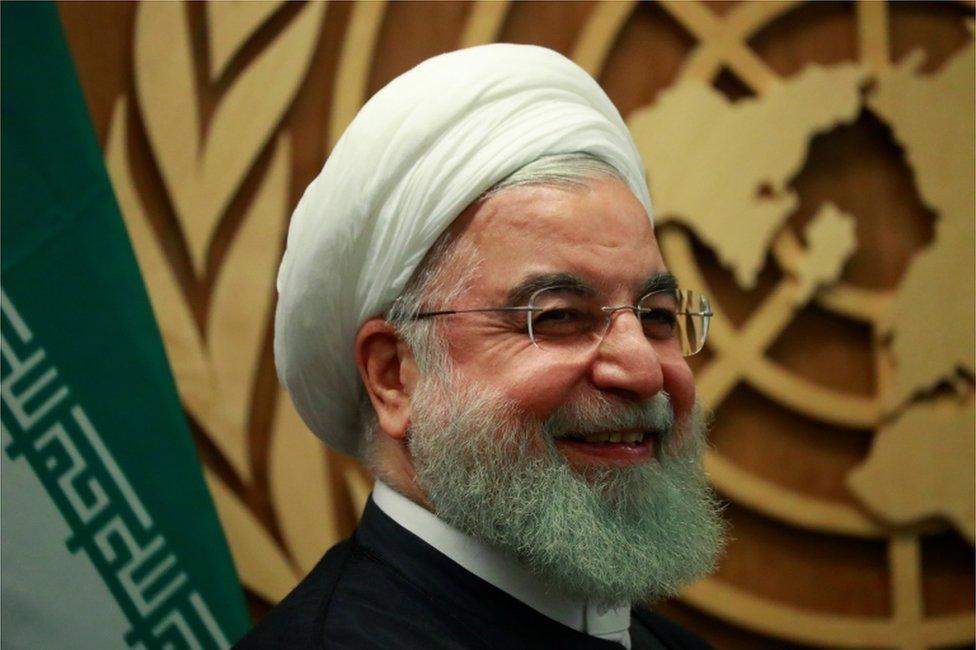
President Macron cornered Iran's President Hassan Rouhani (pictured) to urge for a meeting

In another manoeuvre, President Macron arrived at the Iranian president's hotel suite hoping to arrange a three-way telephone call with President Trump based on the four-point plan.
"Forty-five minutes!," an Iranian source exclaimed. That's how long President Macron is said to have stayed to try to persuade the Iranians.
Several sources recounted how President Rouhani was said to be sleeping in his room and would not be woken up to what could have been, from an Iranian perspective, a nightmare scenario of a phone call without convincing pledges and preparation.
'Positive noises'
This wasn't the only Middle-East axis commanding attention in New York. There were signs too of small, but significant, shifts on another hostile front - the long-entrenched rivalries between regional heavy weights Iran and Saudi Arabia along with its closest ally the United Arab Emirates.
"More leaders are now on the side of peace, not war," Oman's soft-spoken Foreign Affairs Minister Yusuf bin Alawi told me when we met outside the guarded front gates of the UN headquarters. Oman, lauded for its quiet statecraft, is known as a go-to conveyor of key messages.
Iranian officials say they've heard positive noises, through many intermediaries, from Saudi Arabia. And an Arab foreign minister told me they've received messages, also through a third party, that Iran was now willing to discuss regional issues with rivals who accuse it of malign behaviour in their neighbourhood.
President Rouhani used this world stage to flag up boldly an initiative certain to irritate Iran's critics - a new security arrangement called a Coalition of Hope. Foreign Minister Mohammad Javad Zarif told a small group of journalists it was "a serious proposal" which could also include permanent members of the UN Security Council. It was quickly dismissed by some Gulf neighbours but sources say discussions are discreetly taking shape on issues such as energy and maritime security.

You may also be interested in:

Yemen could also be a testing ground. Saudi and Iranian leaders now insist, in public and private, they want to end a destructive proxy war which has brought an impoverished nation to the brink of collapse. US and UN sources speak of the Saudis being "very helpful" now.
Peace is exceedingly difficult to achieve on Yemen's chaotic battleground. But Saudi Arabia, blamed by the UN for most of the civilian casualties, has quietly approved a partial ceasefire while the Houthis, who are aligned to Iran, announced they would unilaterally stop attacks on the Kingdom of Saudi Arabia. Other proposals are also said to be on the table.
But mutual distrust runs very deep. The kingdom and its allies still back the US policy of maximum pressure.
"There is much more room and time for diplomacy and discussion but we cannot reward Iran by incentivising its hostile behaviour," insisted a senior official in the Gulf. "Sanctions relief can only be the outcome, not a pre-condition to, a political process."
'We have to be prepared for everything'
This shift towards a greater openness to some kind of dialogue emerges from growing Saudi disappointment with their ally in the White House when it comes to what they see as a clear pattern of Iranian aggression.
"The Americans didn't respond to the shooting down of the US drone, the attacks on tankers in the Gulf or, so far, to the Aramco attacks, and so the Saudis are really scared the Americans won't protect them," says Joost Hiltermann, Programme Director of the Middle East and North Africa for the International Crisis Group.
"We have to be prepared for everything," underlined an Arab foreign minister. "The US view on the region is shifting and it's not just Trump. They don't want a military escalation."
Saudi Arabia still has to publish what it says will be a "very thorough, very thoughtful" investigation into the spectacular attack on its oil facilities last month which temporarily halved the crude output of the world's biggest oil producer. Riyadh, like Washington, believes this was Iran's doing - despite Tehran's vehement denials.
Saudi Foreign Minister Adel al-Jubeir accuses Iran of a "rampage of death and destruction"
Saudi Foreign Minister Adel al-Jubeir emphasised in an interview that "everybody's trying to avoid war… we will make a decision at the right time." But he made it clear that all options were on the table, including military ones.
"Some in the Kingdom believe a proportionate military strike would send the strongest signal to Tehran," a Western diplomat told me, in a view echoed by other sources. But the kingdom doesn't want to be the one to do it.
Fears of Iranian attacks
Another potential flashpoint looms in the first week of November. Iran is making it clear that it will take another step, its fourth such move, away from its compliance with the nuclear deal unless the US moves to ease sanctions.
"We are warning Iran of consequences," a senior British diplomat confirmed. In other words, Europe could join the US in imposing a raft of sanctions under the terms of the deal.
Iran knows the risks in losing European allies who've been trying, with limited success, to save the nuclear deal from complete collapse. Tehran was taken aback when Germany, UK and France, known as the E-3, joined the US in holding Iran responsible for the attacks on Saudi Arabia's oil facilities.
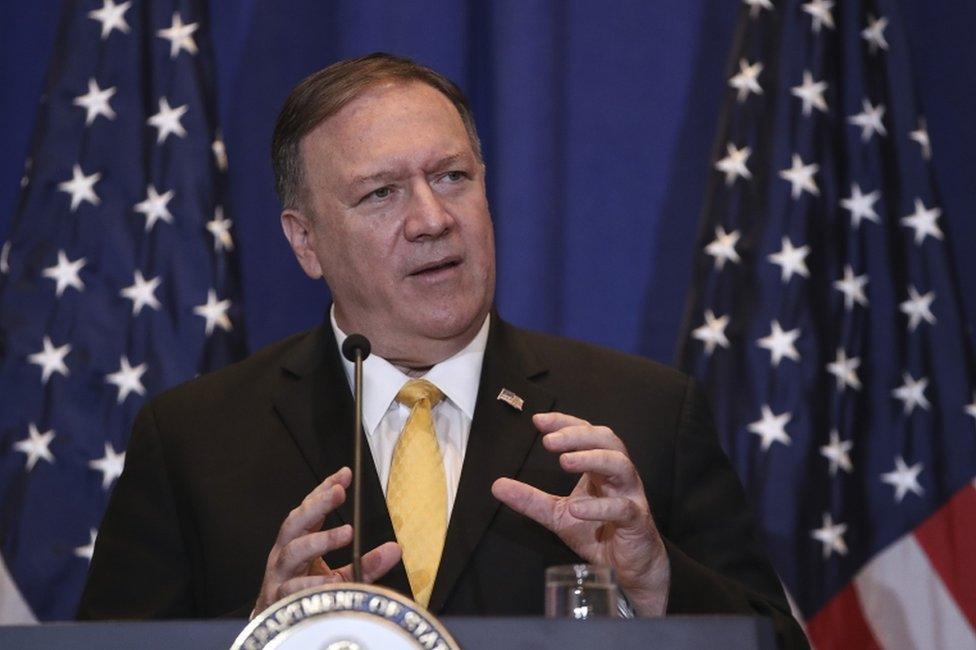
US Secretary of State Mike Pompeo says he is "hopeful" for talks with Iran

"Iran's moves will likely be very careful and calculated not to cross European red lines in a way that collapses the deal," says the ECFR's Geranmayeh about an agreement often described by its acronym JCPOA. "It wants to keep a kind of JCPOA-lite so everyone can come back to it when the Iranians and Americans are able to negotiate the contours of a bigger deal."
There are also warnings of more Iranian attacks in the region - though Iran denies it has targeted any international shipping - to keep making its point that it if continues to suffer under sanctions, and can't sell its oil, others will suffer too.
But the diplomatic dance will also continue. New ideas are said to be under consideration in Paris and Tehran, and other capitals too. US Secretary of State Mike Pompeo has said he remains "hopeful there will be an opportunity to discuss with the Iranians the path forward".
"The more channels the better, because it's a very, very dangerous situation," says Joost Hiltermann of the ICG. "We have to be very clear about what is possible, and use any opportunity that emerges."
- Published7 August 2019
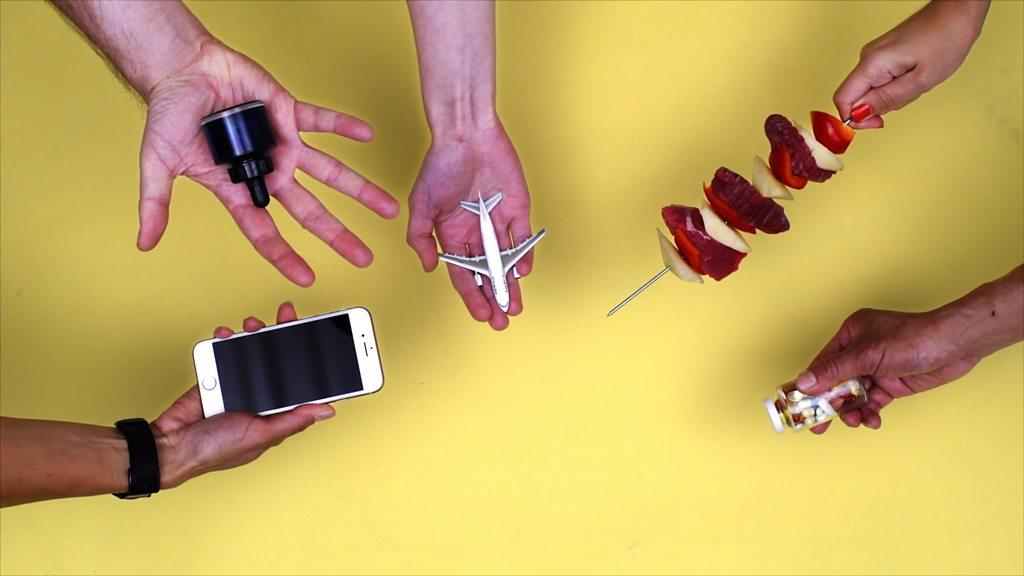
- Published26 September 2019
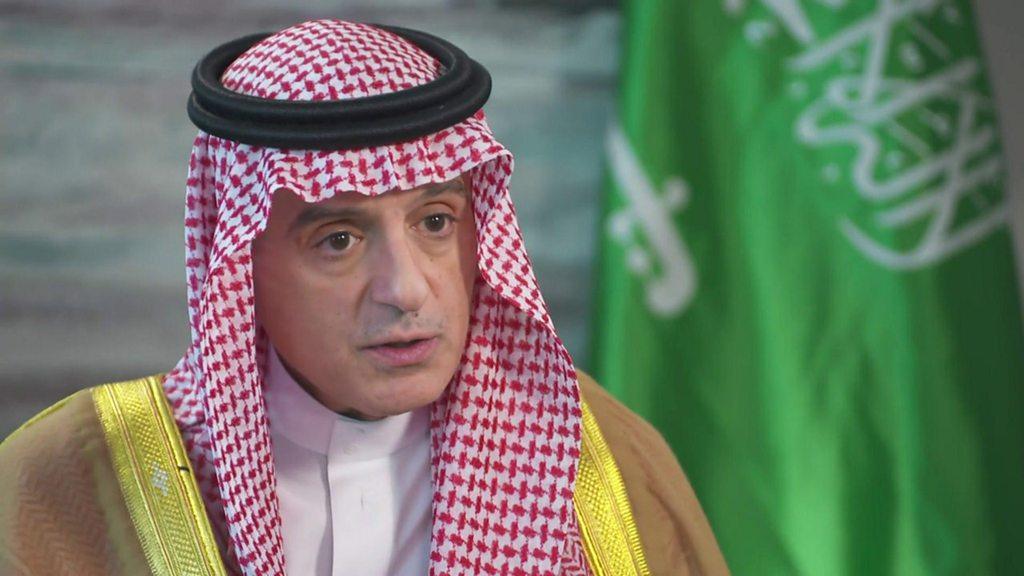
- Published19 August 2019
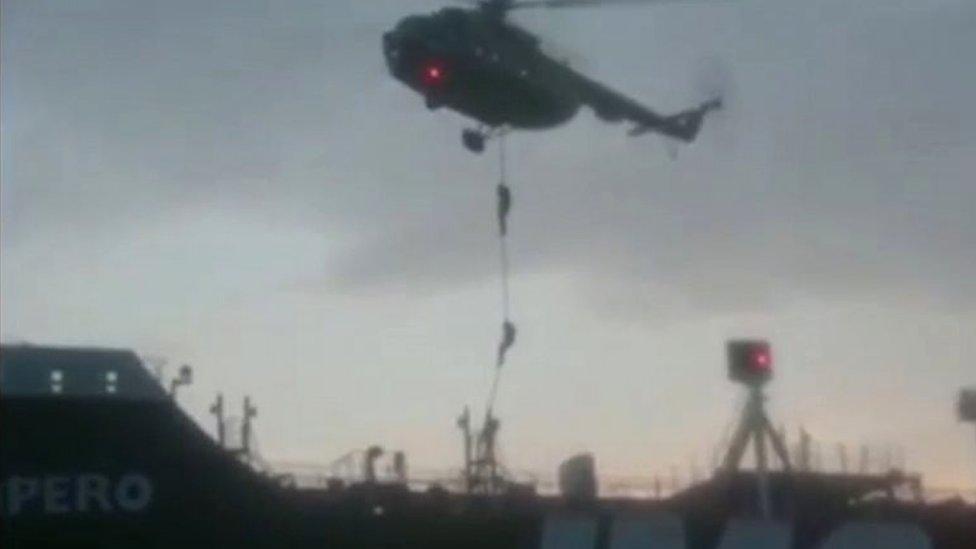
- Published6 January 2020
